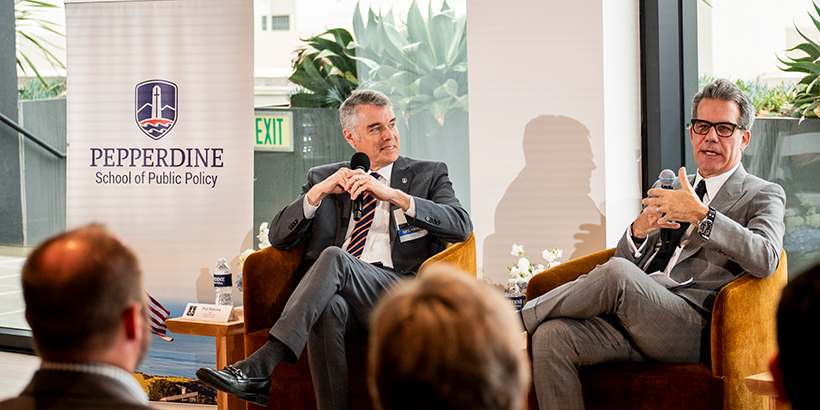Career Opportunities With a Master’s in Public Policy - Top Salaries & Positions

A Master of Public Policy (MPP) can open the door to meaningful careers where you influence change, craft legislation, and shape the future of communities at every level. Whether you're passionate about economic justice, environmental policy, or international affairs, a public policy degree equips you with analytical, ethical, and leadership skills to make an impact.
At Pepperdine University School of Public Policy, the MPP is more than a credential—it’s a transformative experience rooted in service, leadership, and moral decision-making. But what exactly can you do with a master's in public policy?
Careers in Public Policy: An Overview
A MPP degree provides a versatile foundation for a wide range of roles across various sectors. Graduates with an MPP can be found working in government and public administration, nonprofit leadership, policy research and think tanks, international development and diplomacy, private sector consulting and corporate social responsibility, as well as education policy and academic institutions. Each of these sectors offers unique opportunities to influence policy, drive change, and contribute toward the public good.
In the following sections, we’ll explore some of the top career paths within each sector, along with salary ranges and job growth outlooks.
Top Careers for MPP Graduates
Policy Analyst
One of the top careers for MPP graduates is that of a policy analyst. These professionals typically work in government agencies, think tanks, and research institutions. Their primary responsibilities include analyzing data to evaluate existing policies, making recommendations for improvements, and drafting policy briefs and reports. The average salary for a policy analyst ranges from $68,000 to over $100,000, with strong job outlooks, especially in areas such as urban planning, health policy, and environmental regulation.
Public Affairs Manager
Another top career path for MPP graduates is the role of a public affairs manager. These professionals often work in corporations, trade associations, and non-governmental organizations (NGOs). Their primary responsibilities include shaping legislative strategies, engaging with stakeholders and government officials, and managing political and policy risk. Public affairs managers typically earn between $85,000 and $120,000 or more, depending on experience and sector. Key skills for success in this role include strategic communication, regulatory knowledge, and stakeholder analysis.
Tip: Pepperdine’s emphasis on ethical leadership makes MPP graduates ideal for bridging business goals with public good.
City Manager or Local Government Administrator
City manager or local government administrator are other impactful career options for MPP graduates. These professionals typically serve in municipal governments and county offices, where they oversee the daily operations of city departments, manage budgets and personnel, and coordinate infrastructure and development projects. With average salaries ranging from $95,000 to $160,000, this role offers strong leadership opportunities—particularly in growing suburban and rural communities where effective local governance is crucial to sustainable development.
Nonprofit Director
The role of nonprofit director is a meaningful and strategic career path for MPP graduates. Typically found in advocacy organizations, charitable foundations, and international NGOs, these leaders are responsible for leading organizational strategies, securing funding and managing grants, and collaborating with government and community partners to advance their missions. Salaries for nonprofit directors generally range from $70,000 to $130,000, depending on the size and scope of the organization. A key advantage for MPP graduates in this field is their unique training in both quantitative policy analysis and mission-driven leadership, equipping them to lead with both impact and insight.
Legislative Aide or Legislative Director
Legislative aides and government relations specialists typically work within state legislatures, Congress, or executive agencies. Their core responsibilities include tracking policy developments, writing talking points and policy memos, and coordinating with constituents and stakeholders to support legislative priorities. The average salary ranges from $55,000 to over $90,000, with strong potential for career growth. These roles often serve as a stepping stone to senior advisory positions or even elected office, making it an ideal entry point for those passionate about shaping public policy from within government.
International Development Officer
The role of international development officer is an excellent fit for MPP graduates interested in global impact. Commonly employed by organizations such as the US State Department, USAID, the World Bank, and the United Nations, these professionals develop and implement foreign aid programs, advise on governance, education, and public health policies, and collaborate with global partners and host nations. Salaries typically range from $70,000 to $140,000, depending on experience and placement. With their strong foundation in policy analysis and cross-cultural understanding, MPP graduates who focus on international policy are especially competitive in this globally oriented sector.
Policy Consultant
Policy consultant is another dynamic and high-impact career path for MPP graduates. Found in consulting firms, independent practices, and philanthropic foundations, policy consultants provide data-driven advice on policy initiatives, evaluate program effectiveness, and design solutions for complex social problems. Salaries typically range from $85,000 to over $150,000, depending on expertise and client base. The growth potential in this field is strong, particularly in high-demand areas such as climate policy and health care reform, making it an attractive option for those seeking both influence and flexibility in their careers.
Pepperdine’s MPP Advantage

Pepperdine’s School of Public Policy offers a distinctive MPP program that blends the classical liberal arts with rigorous policy analysis and real-world leadership development. Rooted in Pepperdine’s Christian mission, the program emphasizes moral and ethical leadership, equipping students to lead with integrity in complex policy environments. Students can choose from diverse specialization tracks, including economics, American politics, international relations, and more, while gaining hands-on experience through internships and policy practicums. The program also provides strong mentorship from both faculty and seasoned policy professionals. Located near Los Angeles, Pepperdine offers unique access to city, state, and federal government agencies, as well as nonprofit organizations and global institutions.
Frequently Asked Questions
What’s the difference between an MPP and an MPA?
- MPP (Master of Public Policy): Focuses on research, data analysis, and policy creation.
- MPA (Master of Public Administration): Emphasizes implementation, management, and organizational leadership.
Our article "MPP vs. MPA? Why Choose a Master’s in Public Policy Degree" gives a a full detailed explanation of the differences.
Can I work in the private sector with an MPP?
Absolutely. Many corporations hire MPP graduates for corporate social responsibility roles, public affairs, regulatory analysis, and strategy consulting.
Does Pepperdine offer career support for MPP students?
Yes. The School of Public Policy offers tailored career services, alumni mentoring, internship placement assistance, and employer networking events.
Start Making a Difference Today

A Master of Public Policy isn’t just about theory—it’s about transformation. With the right education, your vision for a better world can become actionable policy. At Pepperdine University School of Public Policy, you'll gain the knowledge, experience, and confidence to lead with integrity and serve with purpose.
Ready to take the next step? Apply now and envision your future in public leadership.